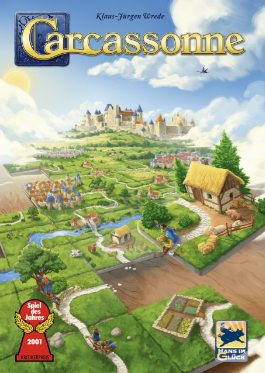
GAME DESCRIPTION: Carcasonne is a tile based game set for 2 to 5 players, originally created in German. Each turn, players attempt to build and control the countryside using Tiles and 'meeples'. Points are determined via a scoring board, and the one in the lead at the games end wins.
BACKGROUND: The term Meeple is one generally used in tabletop games. Originating from Carcassone and the words 'my people', it usually refers to the tokens seen in this game, vaguely human shaped and generally 1 solid color.
SET-UP: Each player chooses 1 of 5 colors, and gets all the Meeples of that color in front of them. The larger Meeple is placed on the scoring board at the start, or at 0 points. The starting tile is then placed, noted for it's dark coloring on the back. All the other Tiles are shuffled and placed face-down.

TURN: The first player then draws a tile, and connects it to the current face-up Tiles in an appropriate manner (roads, buildings and grass connect only to roads, buildings, and grass respectively). That player may then place a Meeple (if they have any) on tile they just placed, with a Meeple on a road as a highwayman, a city as a Knight, or a Monastery as a Monk. However, if a Meeple is already on a connecting tile (such as in the city, or on the same road), then you are not allowed to place a Meeple on that tile.
SCORING: At the end of a players turn, players will score. If a road is closed by a city, village, or loops back on itself, it has ended, and any Meeple on any point of that road gets 1 point per tile with that road, and is then moved off the tile back to the owner, allowing the player to place that Meeple on a later turn. Any city that is closed off also returns to the owner(s), and each connecting city tile is worth 2 points, with any Coat of Arms also worth 2 points. A Meeple on a monastery that is surrounded by Tiles in all 8 directions also returns to the player, and that player gets 1 point per tile, or 9 points.

CONTESTED LOCATION: If a city or road was not originally connected, but became so later with more than 1 Meeple on said location, then it becomes contested. If there is an even amount of more than one color, those players gain the total amount of points. However, if there is more of one color than any other, that player gets all the points. All Meeples are still returned to the owners.
GAME END: Once the final tile is placed, the game ends. All Meeples still in play are still given points. All Highwaymen are given 1 per road tile. All Knights are given 1 point per connecting city, and 1 point per Coat of Arms. Each Monestary is worth 1 point, and 1 per surrounding tile.
CONCLUSION: I have learned to enjoy Carcassonne, but it took me a little time. The game seems intimidating to a new player, and rightly so. The complex strategies of when to place Meeples and where to place Tiles really does change up the game drastically. It's a fun game, but don't expect a new player to love it on their first try. Still, if you are looking for a solid game with highly complex strategies, there's a reason why players keep coming back to Carcassonne.
AFTERTHOUGHTS: Now, these are merely the beginning rules. I have decided not to include the "Supplementary Rules", which introduces Farmers, River Tiles, and Abbots and Garden Tiles. This blog is meant as an overview for newer players of both the game, and tabletop games in general. The rules claim that it is better to introduce these to new players later. I tend to agree, having played this with most of the Supplementary Rules already introduced to me on my first play-through. Now, this may be why I had such a hard time enjoying the game, but I have grown to love it. I would just caution others to introduce these rules to newer players later.

No comments:
Post a Comment